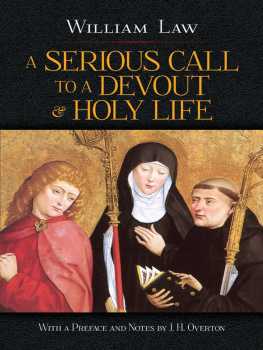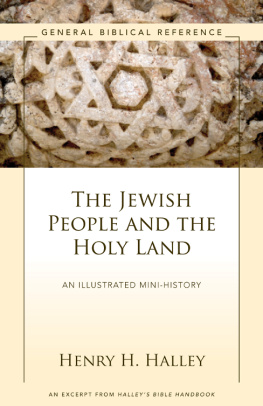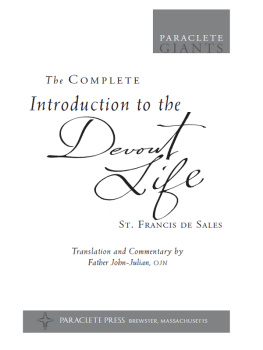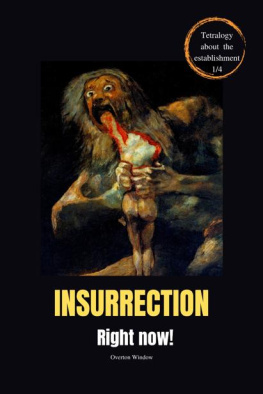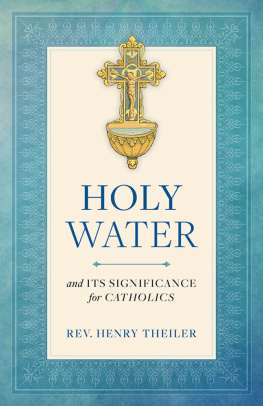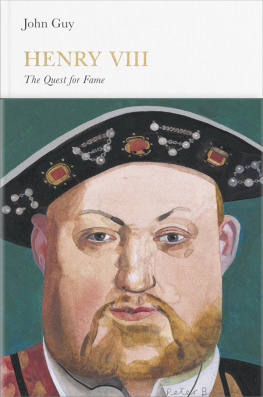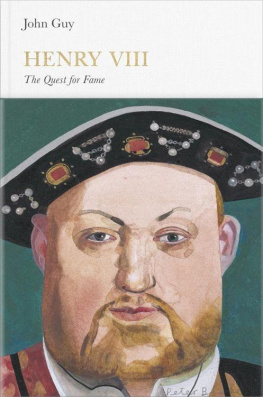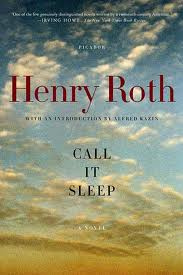Overton John Henry - A Serious Call to a Devout and Holy Life
Here you can read online Overton John Henry - A Serious Call to a Devout and Holy Life full text of the book (entire story) in english for free. Download pdf and epub, get meaning, cover and reviews about this ebook. City: Mineola;N.Y;Newton Abbot, year: 2013, publisher: Dover Publications;David & Charles [distributor], Dover, genre: Religion. Description of the work, (preface) as well as reviews are available. Best literature library LitArk.com created for fans of good reading and offers a wide selection of genres:
Romance novel
Science fiction
Adventure
Detective
Science
History
Home and family
Prose
Art
Politics
Computer
Non-fiction
Religion
Business
Children
Humor
Choose a favorite category and find really read worthwhile books. Enjoy immersion in the world of imagination, feel the emotions of the characters or learn something new for yourself, make an fascinating discovery.
- Book:A Serious Call to a Devout and Holy Life
- Author:
- Publisher:Dover Publications;David & Charles [distributor], Dover
- Genre:
- Year:2013
- City:Mineola;N.Y;Newton Abbot
- Rating:4 / 5
- Favourites:Add to favourites
- Your mark:
- 80
- 1
- 2
- 3
- 4
- 5
A Serious Call to a Devout and Holy Life: summary, description and annotation
We offer to read an annotation, description, summary or preface (depends on what the author of the book "A Serious Call to a Devout and Holy Life" wrote himself). If you haven't found the necessary information about the book — write in the comments, we will try to find it.
A Serious Call to a Devout and Holy Life — read online for free the complete book (whole text) full work
Below is the text of the book, divided by pages. System saving the place of the last page read, allows you to conveniently read the book "A Serious Call to a Devout and Holy Life" online for free, without having to search again every time where you left off. Put a bookmark, and you can go to the page where you finished reading at any time.
Font size:
Interval:
Bookmark:
A SERIOUS CALL
TO A DEVOUT
& HOLY LIFE
W ILLIAM L AW
W ITH A P REFACE AND N OTES BY
J. H. O VERTON
DOVER PUBLICATIONS, INC.
M INEOLA , N EW Y ORK
Bibliographical Note
This Dover edition, first published in 2013, is an unabridged republication of the work first published by Macmillan and Co., London, in 1898.
Library of Congress Cataloging-in-Publication Data
Law, William, 1686-1761.
A serious call to a devout and holy life / William Law ; with a preface and notes by J. H. Overton.
p. cm.
Previously published: London : Macmillan and Co., 1898.
ISBN-13: 978-0-486-49800-3
ISBN-10: 0-486-49800-X
1. Christian lifeAnglican authorsEarly works to 1800. I. Overton, John Henry, 1835-1903 II. Title.
BV4501.3.L39 2012
248.4dc23
2012026601
Manufactured in the United States by Courier Corporation
49800X01
www.doverpublications.com
T HEOLOGY is concerned with setting forth the truth of God as He has revealed it in His Word to His Church. This truth needs new application to the conditions and circumstancesintellectual and socialof each generation. As various problems arise in the world of man, various aspects of Gods truth receive additional emphasis and explanation. Theology grows according to the growth of human knowledge. It brings out of the treasure-house of Scripture things new and old.
A student of theology who wishes to gain accurate knowledge on any particular point, must refer to the time when that point was forced into prominence by some movement or tendency of thought. At such times mens minds, with the full force of their intelligence and their learning, were directed to the full investigation of a question which pressed for immediate solution. At such periods a subject was fully studied and thought out. It is only when we are in contact with minds to which these subjects were of vital importance that we feel their full significance.
Broad lines were laid down, after full discussion, and large principles emerged. These have become permanent possessions, and are even regarded as commonplaces. But we do not feel their force when we read them in a compendium. We only lay hold of ideas as we lend ourselves, in some degree, to the process by which they were acquired. It is for this reason that text-books can never be quite satisfactory. They need to be vitalized by some knowledge, however slight, of the original writers whose thoughts they summarise.
It is the object of the English Theological Library to select works of the chief English theologians which may serve to illustrate their methods, and represent the chief ideas which they enforced. It is inevitable that many of these works are of a controversial nature. It is scarcely too much to say that most men have become theologians in spite of themselves. They have read, and meditated, and taught, till some tendency of popular thought ran counter to their ideas. They were bound to face this fact, to penetrate more deeply into the foundations of their own belief, and then to state their results and give their reasons at every stage. They had to make good their own position against opponents who often owed their importance merely to the fact that they had a strong body of floating opinion behind them. One partoften an ungrateful partof their work was to clear away partial conceptions which rested on no solid basis. They had to destroy before they could begin to build. Even in our own day we have need to learn the temper and method in which a controversy may be conducted so as to substitute accurate thinking for vague opinions, or prejudices which have their root in the desire to maintain an existing system rather than to seek for the truth.
The English Theological Library, as it advances, will not only put forth standard works of English theology, but will illustrate the history of the great crises of the English Church. In many cases it is difficult to select, among the voluminous writings of a theologian, a particular work which adequately expresses his ideas. But a collection of detached passages is dangerous, as it necessarily depends upon the opinion of him who makes the extracts, and reduces formulated results and obiter dicta to the same proportions. It is better to read one complete treatise than a number of quotations. It is only so that it is possible to gain a knowledge of the writer and of his method. In theology, above all other subjects, it is the intellectual temper of the writer which inspires confidence in his conclusions.
English theology is penetrated by the same spirit as distinguishes the English character in other branches of literature. It is strong in sound and massive learning, and has never had reason to separate itself from other departments of English thought. It has no style of its own, and is not expressed in technical language, nor clothed in special phraseology. Its great products rank among the noblest specimens of English prose, and its literary merits are of a very high order. It may be read by readers of every class. Doubtless the forms of appeal to the popular consciousness vary in every age, and methods which once were powerful soon grow antiquated. But pulpit oratory, after all, lasts longer than other forms of oratory, and the roll of English preachers has produced finer examples of eloquence than exist elsewhere.
The strenuous pursuit of truth, sobriety, high thoughts, commanding power of expressionthese are great qualities. They are all to be found in the books which are to be issued in this series. Introductions and notes will serve to bridge over the gulf which must always to some degree separate the thought of the past from the thought of the present. It is better to read one great book than a series of little books. It is better to seek for the truth where its issues were most seriously felt, than to rest content with tabulated arguments in its favour. Theological students will profit by contact with great minds. It is for their guidance especially that this series is designed. They would gain in power to face the problems of our own time if they were better acquainted with the great heritage of the past, and were animated by the same spirit as their predecessors, whose lot was cast in no less difficult days.
M. LONDON .
T HE publication of the Serious Call in 1728 marked an epoch in the history of religion in England. It naturally took some little time for its influence to make itself generally felt; but there is little doubt that the great Evangelical Revival, which, roughly speaking, may be dated from about 1738, owed its first impetus to this book more than to any other. The fact is curious, for the book is certainly not, in the technical sense, an Evangelical book, and its author was very far indeed from identifying himself with either section of the Evangelical movement. A brief account, however, of the life of William Law, and of the state of religion in England at the time when the Serious Call appeared, will explain the difficulty.
William Law was born in 1686 at Kings Cliffe in Northamptonshire, where his father was a grocer. His early religious training was that of the old-fashioned church type, from which he never really diverged, though he materially modified his views in later years; and it was, in the long run, among Churchmen of the old-fashioned type, rather than among Methodists or Evangelicals, that the Serious Call was most highly appreciated, and its influence most deeply felt. In 1705 he went as a sizar to Emmanuel College, Cambridge, and, having graduated in 1708, was elected a Fellow of the Society in 1711. In the same year he received Holy Orders; and for some time remained at the University, taking occasional duty in and about Cambridge, but chiefly engaged in private tuition. He made no secret of his Jacobite proclivities; but during the reign of Queen Anne the dynastic question was, to a great extent, in abeyance. The death of the Queen, however, in 1714, brought matters to a crisis; and William Law, declining to take the oaths of allegiance and abjuration, lost his Fellowship in consequence. He wrote a characteristically outspoken letter on the subject to his now widowed mother, giving his reasons for openly joining the ranks of the nonjurors, which were apparently satisfactory to his family. In 1717 he published his Three Letters to the Bishop of Bangor , a most brilliant and powerful defence of church principles against the latitudinarianism and erastianism of Bishop Hoadley. In 1726 appeared the first of his practical treatises, his Christian Perfection, which began the work which the Serious Call completed. About this time (it is impossible to ascertain the exact date) he became an inmate of the family of Mr. Edward Gibbon, grandfather of the historian, at Putney, being engaged as domestic tutor to the second Edward Gibbon, the historians father, but acting also as a sort of spiritual director to the whole family. His patron had strong Jacobite proclivities, which were intensified by the fact that he thought he had been shabbily treated by the Government, as a director of the ill-fated South Sea scheme; and it was not at all uncommon for non-juring clergymen to act as tutors in such families. Law left a most favourable impression of integrity and ability in the Gibbon family, an impression which even affected the third Edward Gibbon, the historian, though the two men differed as widely as possible in their opinions. In 1727 Law accompanied his pupil as governor to his old College, Emmanuel, Cambridge; and it was partly at Putney, partly at Cambridge, that the Serious Call was written.
Next pageFont size:
Interval:
Bookmark:
Similar books «A Serious Call to a Devout and Holy Life»
Look at similar books to A Serious Call to a Devout and Holy Life. We have selected literature similar in name and meaning in the hope of providing readers with more options to find new, interesting, not yet read works.
Discussion, reviews of the book A Serious Call to a Devout and Holy Life and just readers' own opinions. Leave your comments, write what you think about the work, its meaning or the main characters. Specify what exactly you liked and what you didn't like, and why you think so.

